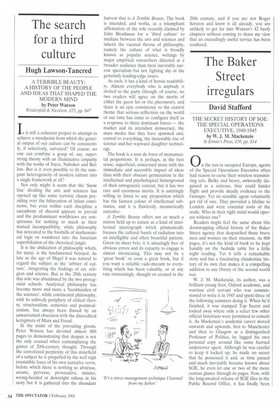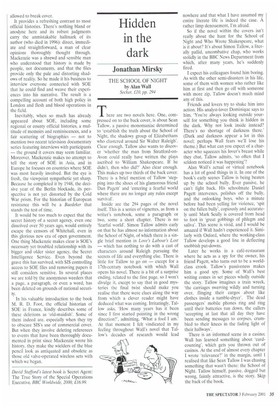The Baker Street irregulars
David Stafford
THE SECRET HISTORY OF SOE: THE SPECIAL OPERATIONS EXECUTIVE, 1940-1945 by W. J. M. Mackenzie
St Ermin's Press, BO, pp. 814
0 n the run in occupied Europe, agents of the Special Operations Executive often had reason to curse their wireless transmitting sets. Bulky and heavy, awkwardly disguised as a suitcase, they could hinder flight and provide deadly evidence to the Gestapo. Yet no sensible agent voluntarily got rid of one. They provided a lifeline to London and were essential tools of the trade. Who in their right mind would operate without one?
Readers might feel the same about this doorstopping official history of the Baker Street agency that despatched these brave men and women on their missions. At 800 pages, it's not the kind of book to be kept handily on the bedside table for a little night reading. Yet it tells a remarkable story and has a fascinating clandestine history of its own that makes it a compelling addition to any library of the second world war.
W. J. M. Mackenzie, its author, was a brilliant young Scot, Oxford academic, and wartime civil servant who was commissioned to write it in 1945 and spent three of the following summers doing it. When he'd finished, it was stamped Top Secret and locked away where only a select few other official historians were permitted to consult it. As Mackenzie's academic career moved onwards and upwards, first to Manchester and then to Glasgow as a distinguished Professor of Politics, he lugged his own personal copy around like some harried undercover agent. Although he was careful to keep it locked up, he made no secret that he possessed it and, as time passed and much inevitably became known about SOE, he even let one or two of the more curious glance through its pages. Now, with the long-awaited release of SOE files in the Public Record Office, it has finally been allowed to break cover.
It provides a refreshing contrast to most official histories. There's nothing bland or anodyne here and its robust judgments carry the unmistakable hallmark of its author (who died in 1996): direct, immediate and straightforward, a man of clear opinions thoroughly thought through. Mackenzie was a shrewd and sensible man who understood that history is made by people, not documents, and that the files provide only the pale and distorting shadows of reality. So he made it his business to interview everyone connected with SOE that he could find and weave their experiences into his narrative. The result is a compelling account of both high policy in London and flesh and blood operations in the field.
Inevitably, when so much has already appeared about SOE, including some regional or county official histories, a multitude of memoirs and reminiscences, and a fair scattering of biographies — not to mention two recent television documentary series featuring interviews with participants — the ground it covers may seem familiar. Moreover, Mackenzie makes no attempt to tell the story of SCE in Asia, and in Europe he focuses on countries where SOE was most heavily involved. But the eye is fresh, the viewpoint sympathetic yet sharp. Because he completed it by 1948, the decisive year of the Berlin blockade, its perspective is not yet distorted by the Cold War prism. For the historian of European resistance this will be a Baedeker that stands the test of time.
It would be too much to expect that the secret history of a secret agency, even one dissolved over 50 years ago, would entirely escape the censors of Whitehall, even in this glorious new era of open government. One thing Mackenzie makes clear is SOE's necessary yet troubled relationship with its bigger and older sister agency, the Secret Intelligence Service. Even beyond the grave this has survived. with SIS controlling access to SOE files and removing papers it still considers sensitive. In several places we are told by the anonymous weeders that a page, a paragraph, or even a word, has been deleted on grounds of national securi ty.
In his valuable introduction to the book M. R. D. Foot, the official historian of SOE in France, kindly describes some of these deletions as 'old-maidish'. Some of them indeed are, especially when they try to obscure SIS's use of commercial cover. But when they involve deleting references to events that have been thoroughly documented in print since Mackenzie wrote his history, they make the wielders of the blue pencil look as antiquated and obsolete as those old valve-operated wireless sets with which we began.
David Stafford's latest book is Secret Agent: The True Story of the Special Operations Executive, BBC Worldwide, 2000, f16.99.



























































 Previous page
Previous page